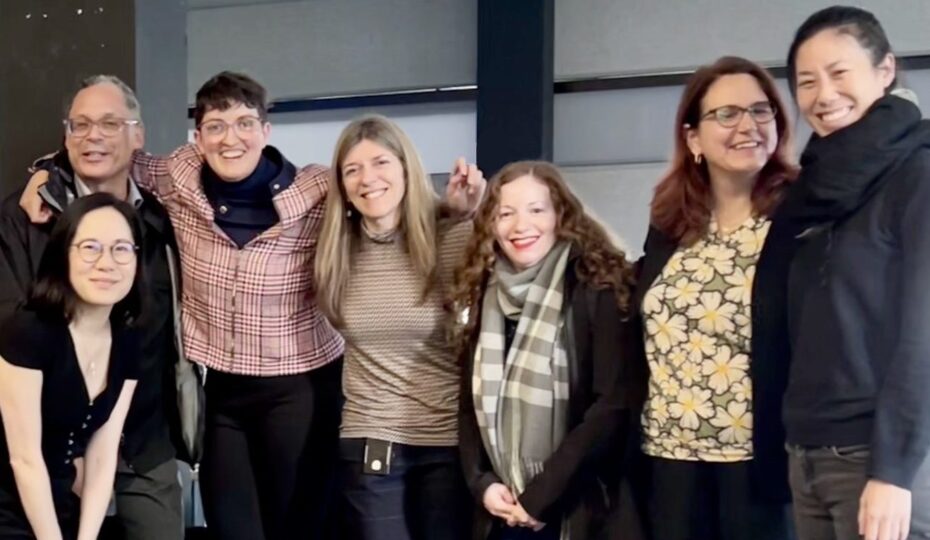
A pair of formal mentorship programs established by the Office of the Provost and Executive Vice-President (Academic), are helping support McGill faculty through all stages of their careers.
For Katherine Hanz, participating in the Development Initiative for Academic Leadership (DIAL) program gave her a much better understanding of the University’s governance structures, policymaking and budget as she took on the leadership role of Associate Dean, Teaching & Learning.
“It helped to demystify procedures and policies at a high level,” explained Hanz, who started at McGill 15 years ago as Liaison Librarian. “It was also really great in terms of connecting with other leaders at McGill and creating a network outside of my own unit on campus.”
Hiroshi Mamiya, an Assistant Professor in the Department of Epidemiology, Biostatistics and Occupational Health, enrolled in the Provost’s Faculty Mentorship Network (PFMN) during his first year of working at McGill. He was paired with an associate professor who served as his mentor.
“The mentorship was instrumental for survival in the first year of my academic career,” said Mamiya. “He gave me critical advice, such as how to balance teaching, grant applications and research. ”
Supporting success
Every year, McGill welcomes new tenure-track faculty members to its campuses and invites mid-career faculty to step into key leadership roles.
Those situations can be daunting.
“Mentorship is a powerful catalyst for the fostering of healthy, inclusive cultures where everyone can learn and grow together,” said Kit Malo, Associate Director Inclusive Excellence. “Our aim is to enhance members’ sense of inclusion and belonging at the institution.”
Fulsome mentorship has been shown to have a positive impact on recruiting, retention and succession planning, with an eye to supporting a diverse and excellent academic body.
“If you’re thinking of applying to McGill and you see all these opportunities, it might influence your perception of this being a place where you could really grow and develop your potential as an academic,” said Ande Clegg, Senior Employment Equity Advisor. “Everyone has the right to be part of the culture at McGill.”
Support for pre-tenure faculty
The PFMN is open to all pre-tenure faculty, at any time. Successful candidates are paired with one of the program’s faculty mentors, an impressive list that includes Directors, Associate Deans and Canada Research Chairs.
“Part of the push for establishing this program was the recognition that members of equity groups are often left out of informal mentoring networks,” said Clegg. “The PFMN is formalized, accessible and public. You don’t have to be in-the-know to find mentor support.”
“It’s support for junior academics who want to develop their skills and understanding of how to navigate the university,” said Malo. “McGill is a community, and we’re here to support each other.”
Opportunities for mid-career and established staff

The DIAL program is tailored to tenured faculty who are new to or interested in academic leadership; it’s now in its third year.
Participants are paired with an established academic leader (such as a Dean, Vice-President or Department Chair), attend workshops to learn about academic leadership and develop cross-faculty peer mentorship relationships with other academic leaders, another vitally important form of mentoring.
“Sometimes being in a leadership position feels a bit lonely,” said Hanz. “Being able to talk confidentially about difficult situations and management issues was really helpful.”
The DIAL program also offers a chance for mid-career academic leaders to engage with senior administration, as many workshops and mentoring opportunities include Deans, the Provost and other VPs.
“By the time people leave the program, they’ve had face-to-face experiences with high-level senior administration,” said Malo. “McGill’s mentorship programs are offering academics an opportunity to build community connections in a unique and lasting way.”
A win-win for McGill’s faculty and community
Equity staff credits the leadership of Angela Campbell, Interim Deputy Provost, Student Life and Learning, and Christopher Manfredi, Provost and Executive Vice-President (Academic), for the development, support and strength of the mentorship initiatives.
“They have understood at a deep level the way formal mentoring programs supports academic leadership with a view to equity,” said Malo.
Clegg and Malo see the entire McGill community benefiting from these programs, whether it’s from stronger governance practices, higher faculty retention rates or increased engagement among the students in their classrooms.
“These programs offer huge potential for transformative change,” said Malo, “which ultimately strengthens the mission of the university.”
Applications for PFMN are accepted year-round; pre-tenure professors from all faculties are welcome to apply. Please contact Anne-Marie Durocher at anne-marie.durocher@mcgill.ca with any questions.
DIAL’s 2024-2025 cohort has been selected. Please contact kit.malo2@mcgill.ca if you are interested in future cohorts, or for more information.
